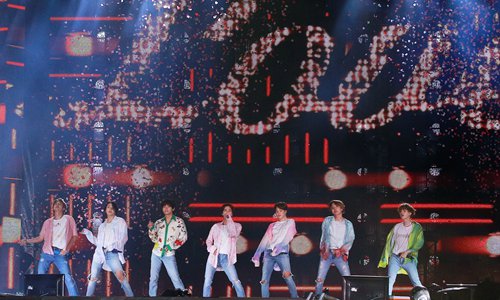HOME >> ARTS
Chinese trainee reveals the hardship behind K-pop idols’ climb to stardom
By Global Times - Life Week Source:Global Times Published: 2019/10/13 18:53:40

K-pop band BTS Photo: IC

Tifa Chen Photo: IC
K-pop idols have been sweeping the world recently with their intricately choreographed dance performances and catchy pop tunes. Although K-pop has its origins in South Korea, entertainment companies in the country have set their sights on tackling the globe by recruiting talent from other countries to create girl and boy bands tailored for specific markets.
One of these talented individuals is Tifa Chen, a young 29-year-old woman from Nanjing, East China's Jiangsu Province, who trained at South Korean entertainment companies Cube Entertainment and CJE&M.
First rising to fame by placing second place in Chinese singing reality show The Voice of China 4 in 2015, Chen has recently signed with Universal Music Group.
Chen sat down with Chinese entertainment Life Week recently to discuss her rise to fame, providing a rare behind-the-scenes look at the training process that produces K-pop idols.
Overseas strategy
Chen first became a trainee in South Korea during her second year of university.
"I have talent for singing and music has always been one of my hobbies. I had studied professional folk songs and the electronic keyboard," Chen told Live Week.
Chen's mother wanted her to be a teacher because of the stability the job provided, but Chen noted that she wasn't interested in such a "stable"life and so chose to enroll in the Beijing Contemporary Music Academy.
"When I was in my second year of university, Cube Entertainment, the entertainment company that South Korean singer Hyeon-a belongs to, came to our university for public auditions," Chen said.
Chen noted that the pop music market in South Korea is very small, so many entertainment companies began looking to expand to oversea markets years ago.
"One strategy is to recruit overseas faces into a K-pop group," said Chen.
"Such as [Chinese singer] Han Geng in Super Junior."
Chen noted that she learned about South Korea's trainee system when she was in high school, a time when Super Junior was very popular in China, but she had no idea how to get her foot in the door.
"I never imagined that my opportunity would come after I entered the music academy," said Chen.
Different path
"I recall that Cube Entertainment chose four girls at that time, including myself," said Chen.
"One of us hadn't even graduated from high school yet. Her parents thought she was too young for this career, so she quit," Chen said, noting that in South Korea some potential idols begin their training in primary school.
When it comes to trainees from China, most managed to persuade their parents after they reached adulthood, even though most of them were still unhappy about having their child enter this career.
Chen said that auditions such as the one she went through mainly focus on trainees' special talents.
"One was chosen due to their singing skills, another was chosen because they were a good dancer," Chen explained.
"There was also someone who couldn't do anything but was still chosen because they have a pretty face."
Chen said no matter what talents a person may possess, all the trainees must go through a complete training process that includes classes on singing, dancing, acting, physical training and languages.
"People always say that South Korean idols are great at performing even at their debut," Chen said.
"That's because they have been training for such a long time."
Chen had never learned how to dance, so her dance teacher designed a dance routine for her that included all the most basic dance moves.
"We didn't practice anything but this dance during our class, which lasted about six months," said Chen.
"And now I can learn any type of dance in a short time because of that dance routine."
Tough competition
"In many South Korean entertainment companies, there are strict elimination mechanisms," said Chen.
"There are monthly tests and if you cannot meet the standards for two or three months in a row, you will be eliminated by the company."
Chen said she had to practice 10 hours a day, six days a week and most of the time she had to practice by herself, which was very tough.
"Training costs companies a lot of money so they have to eliminate some of them," said Chen.
South Korean has a mature election, development and marketing system for idols. However, Chen admitted that the system is a very mechanical procedure.
"That's why South Korea has only a few independent singers, because that requires a very unique personality," explained Chen.
"On the opposite end of the spectrum, in a K-pop group, companies assign someone to a particular role."
Chen said that this leads to many K-pop boy and girl bands to feel very similar and may end up causing aesthetic fatigue.
"This 'assembly line' system can quickly churn out idols," said Chen.
"There are new groups debuting every day."
Chen said that if a new band does not meet a company's expectations, the company will turn to another new group.
"I think to be popular is not so reliable because we will be replaced by newcomers very soon," said Chen.
"The more important thing is to make more works for people to remember. For instance, we are still listening to Jacky Cheung Hok-yau's songs."
Newspaper headline: Price of fame
Posted in: MUSIC